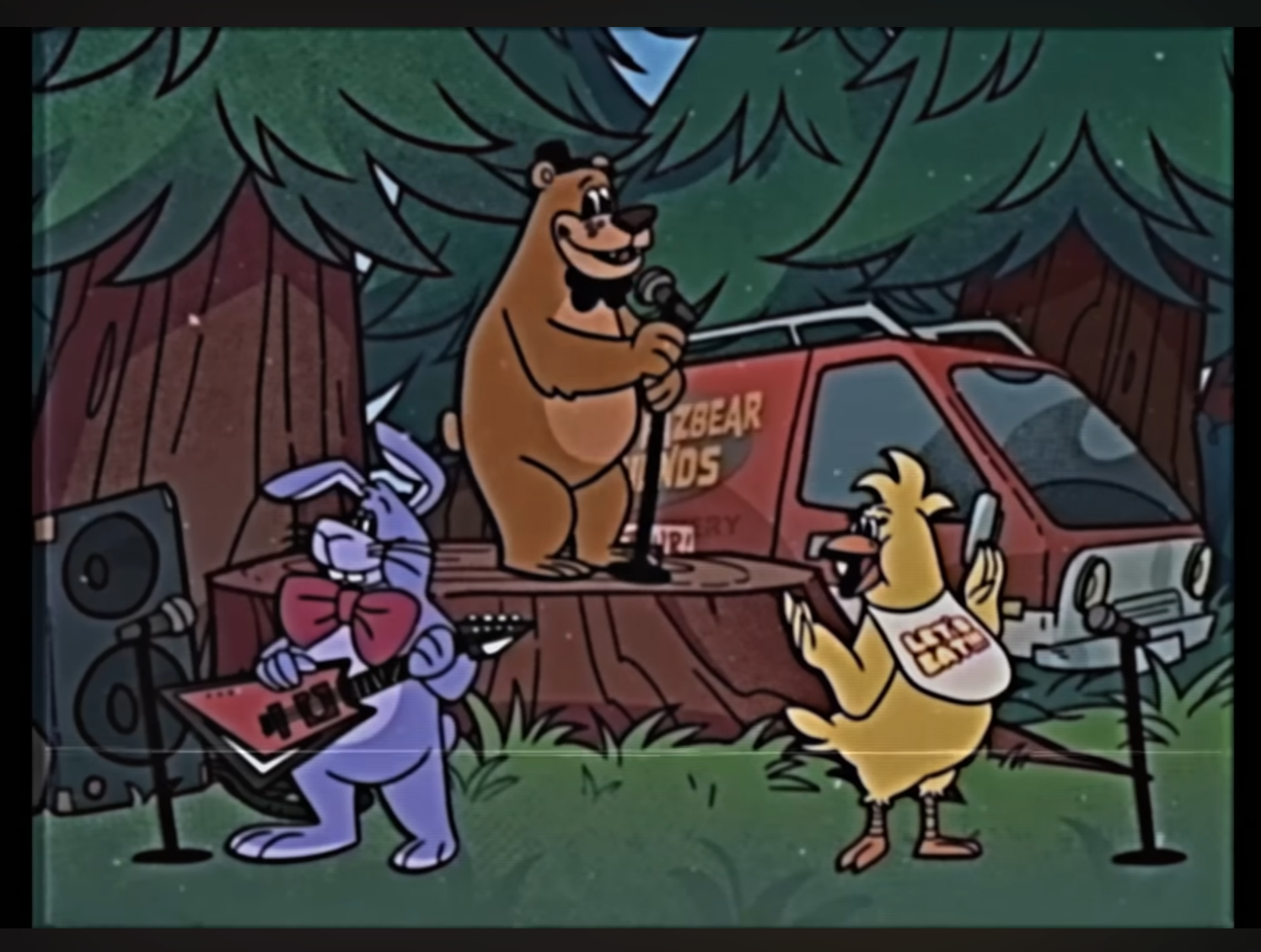Overview
Freddy & Friends (originally premiered as Fredbear & Friends) is an animated television show with episodes airing from 1983 to 1989.
It is based on characters associated with the Fazbear Entertainment brand, particularly Freddy Fazbear, Bonnie, Chica, and Foxy,
who serve as the primary cast.
Premise
The show follows Freddy and his band of animal musicians as they adventure through the fictional land of Animatronica.
Each episode introduces some problem that the band must overcome, often involving the series' villain Mad Chipper, his son Little Chipper,
and their mad scientist helper Madjack.
who have sinister plans to chop down all the trees in Animatronica in order to construct an army of robotic minions.
The band often must travel across the land to defeat them, meeting new friends along the way.
Characters
Main Band
The main cast consists of Freddy Fazbear, the goofy protagonist and leader of the bad, followed by Bonnie the Bunny, the quiet guitarist and comedic relief, Chica the Chicken, the supportive
cook and insatiable eater, and Foxy the Pirate Fox, the sea-loving accordionist with an eye for treasure.
Supporting Characters
Early episodes feature the Fredbear character, who serves as a helpful guide for Freddy's band.
However, after the closing of Fredbear's Family Diner following the death of Charlotte Emily, the character was dropped from the show.
His role was taken, in part, by the Golden Freddy character, though his frequency of appearance decreased significantly.
After the Missing Children Incident in 1985, Golden Freddy, as well as the related Spring Bonnie character, would be dropped entirely.
To promote the planned opening of Circus Baby's Pizza World, a 6-episode arc followed the band's interaction with the Funtime Chuckle, a group of performers for the Pinwheel Circus,
led by Circus Baby, including Funtime Freddy, Funtime Foxy, and the trio of Balloon Boy, JJ, and DeeDee.
Most of these characters would not reappear, the main exception being Balloon Boy, who would become a recurring character.
Later episodes would explore Foxy's large family of pirates, including Funtime Foxy, Lolbit, and Mangle
(an allusion to the mangled Funtime Foxy animatronic who starred at Freddy Fazbear's Pizza for a brief period in 1987).
These characters form a crew of pirates who sail across Rotorfish Ocean, occasionally stopping by Lilygear Lake to visit the main cast.
Antagonists
Mad Chipper, a large wooden beaver, is the primary antagonist, though he is usually reserved to his lair, not interacting directly with the main cast.
His son, Little Chipper, is more active in childlike taunting of Freddy's band.
Madjack is a nefarious scientist who works for Mad Chipper, creating robotic armies of Auto Chippers, Prototypes, and Mad Endos, as well as evil abominations such as Porkpatch.
In episode 32, Madjack summons the great and evil Purplegeist, a cosmic ghostly creature who spreads his evil across Animatronica and takes over as the new primary villain.
Mad Chipper and his goons, having been defeated, reluctantly team up with Freddy's band to defeat the Purplegeist for the final season.
Freddy & Friends World
In 1989, the Freddy & Friends team worked with Fazbear Family Arcade
to adapt the show to video game format as Freddy & Friends World.
However, due to budgetary restrictions, the game could not be finished, and was cancelled later that year.
In 2015, the Fazbear's Fright team acquired the unfinished work, and independently developed it to completion,
releasing it digitally as a part of the Fazbear Family Arcade Mix bundle.
The game's narrative diverges from the source material in a variety of ways, and is generally thought to give a darker and more experimental take on the Freddy & Friends story.
For example, the Golden Freddy character appears prominently in the game, despite having been written out of the show.
It was met with mixed reviews.
The team was praised, in part, for going beyond expectation and bringing to life a previously lost Fazbear Arcade experience.
However, there are many complaints that the game is "half-finished", with many glitches and errors making their way into the final release.
Many were also unhappy with the modernized story direction.
Nonetheless, the game has fostered a strong community of dedicated players.
The story differences have sparked infamous debate among fans regarding which is the "true" or "canon" version.
Some argue the original story should take priority, especially considering it was developed largely by an unofficial source.
Others argue the game adaptation should be considered the more 'definitive' take on the story,
allegedly resolving a handful of the show's plot-holes.
The debate rages on to this day.
